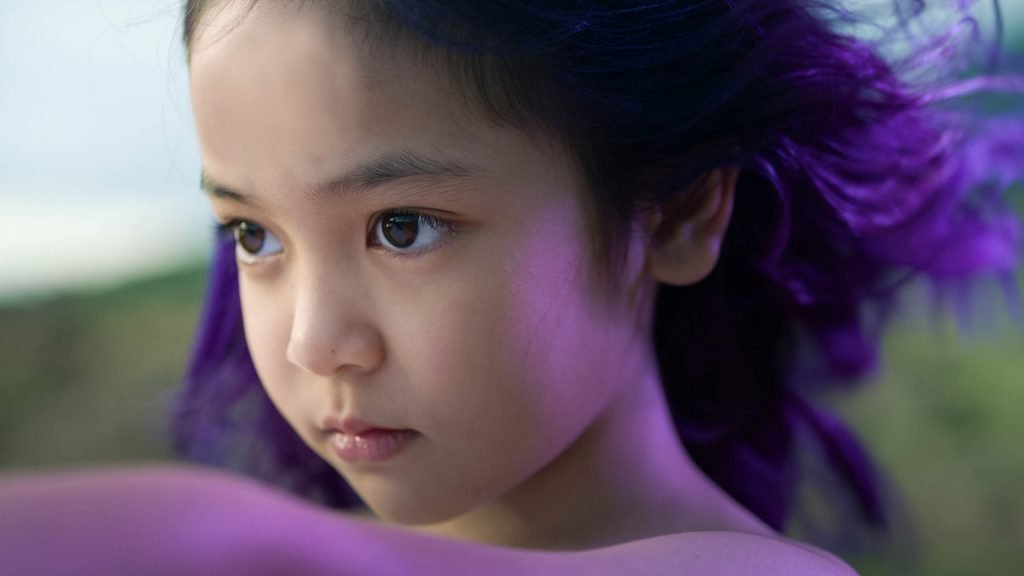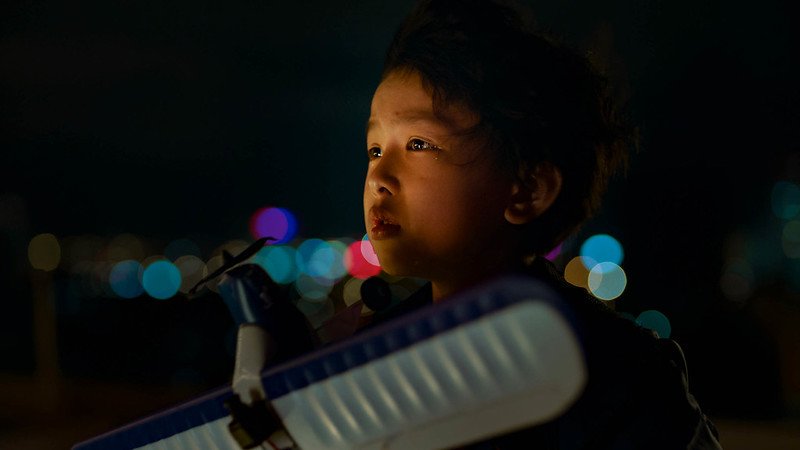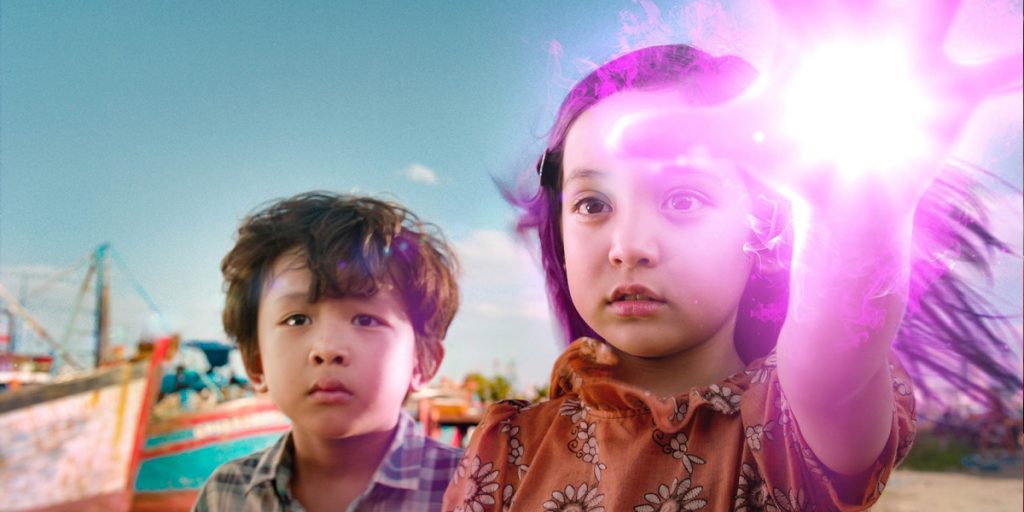Reminiscent of Disney Channel kids’ adventure films, Maika is a fresh take on the E.T storyline, told with a fondness for any child’s worldview.
Maika: The Girl From Another Galaxy has a premise that’s very instantly recognizable for anyone born between 1990 and 2010. It’s not that people born later haven’t seen Steven Spielberg’s classic E.T, but I remember those two decades being a time when a lot of similar stories were told on the silver screen. Live-action kids’ adventure movies with a science fiction background were a significant part of my childhood growing up, with the local TV channels premiering and repeating those films pretty frequently. In Maika, there’s a girl from the planet Maika whose ship crashes on Earth during a meteor shower. Her objective had been to find a friend who was supposedly stranded on Earth, and then call for the mothership. However, due to an accident, the transmitter on her ship is broken. This is the plight in which Vietnamese local 10-year-old boy Hung (Phu Truong) finds her. They decide together that she should call herself Maika (Diep Anh Chu), and then Hung tells her his father Thanh (Ngoc Tuong) will fix the transmitter, so they can send her home after finding her friend.
That may be the central premise, but the film takes its time getting there, and as an adult feeling nostalgic for his childhood, I loved the 20 odd minutes of the movie before it gets there. Not that it doesn’t keep up the good work till the end credits, but this is the bit that essentially introduces us to the world that director Ham Tran has envisioned, and it’s a thrilling ride, especially for the target audience – kids, because they’ll find the camera working like their eyes do – with a certain sense of wonder about everything, adding a layer of dramatization to the occurrences in the surroundings. The film starts with a story about a time before the moon was born, when the heat dried up the rivers and one mother sacrificed herself to plead with the sun so as to ensure a future for all kids. This is narrated during a visual of how the sun dried up the earth from a spatial view. After that, the narration continues while we are introduced to Hung’s mother in hospital, cuddling Hung. Right after her death, the film’s name appears.
The world we enter right after that is vibrant, colourful and intoxicating. Houseboats, a construction crew, a kids’ slide, a neighbourhood of quirky people, and the biggest attraction for the next 5 minutes or so – a toy plane. Nicknamed ‘Comet’ by its owner and driver Hung, it flies through tight spaces, bends around corners at the last minute, and does donuts in the air while the camera follows it with the frenzy which a kid would display on being presented with such a scene. And to add to the excitement, there’s the rich neighbour’s kid, Beo (Tin Tin) with a drone of his own, trying to take down Comet with a collision, like a pirate who claims their territory. Hung is at the base of the slide, controlling the plane and watching the footage from Comet’s camera on his phone, while his friend, My (Khahn Nhur) watches from on top of the slide, playing the role of both commentator and guide to Hung. As the two drones race around the neighbourhood, through a construction site, swiftly navigating the tightest of spaces, and avoiding large obstacles, we’re introduced to the other people in the locality.
The primary conflict is a very familiar one for residents of any old neighbourhood A corporation wants to claim the land, and they’re paying tenants of the building in which Thanh lives with Hung to push them to leave. In fact, My’s family does leave, and, around the same time, Thanh takes up a lot more work to pay off debt. So Hung is essentially left alone, unable to communicate with his father, and not having any friend around. Thanh promises to take him to see the meteor shower that’s due in a week, but while Hung excitedly counts the days, Thanh exhaustedly overworks himself to the point that he falls asleep during the shower and forgets about his promise to Hung. Disappointed, Hung watches it himself, till a peculiar purple-coloured glowing meteor lands close by and he runs off on his bicycle to find out what landed at that spot. Interestingly, a family was camping right beside the lake in which it landed and they ran off. This simple manner of establishing Hung’s curiosity about phenomena around him is very accessible both as an adult and a child. I remember feeling inspired as a kid on seeing characters like him set out on bikes with torches instead of running to find an adult on the quest for something intriguing.

Apparently, that was Maika’s spaceship, and, while Hung initially leaves because Beo suddenly shows up, he’s not afraid, and he goes back to the site the very next day. His disconnect with Thanh is portrayed minimally, with Hung getting a severe scolding for disappearing at night and Hung emotionally countering with the reminder that Thanh was supposed to be there. There’s a place for subtlety, and while that often happens in children stories too, the world of Maika definitely doesn’t. I really enjoyed the explicit portrayal of the emotional thread, with exposition through dialogue without euphemisms and metaphors. Actually, this is essential because of the protagonist’s character design. He’s lonely and grieving, but not internalizing it. He doesn’t like going out of his way for himself, but when confronted, he doesn’t keep things hidden underneath. And the transparency in the father-son relationship definitely feels very endearing, because it portrays the dynamic that most of Hollywood especially stereotypes against. Sure, there’s strictness, but affection isn’t necessarily lacking, and I feel like the World needs to see that even such a healthy relationship can exist. Thanh is very soft with his son, even if he’s clear about principles, and enforcing rules. He is genuinely concerned and wants to understand his kid. Not all Asian parents are controlling people with no regard for their children’s feelings.
Maika’s seen to adopt the persona of a young girl about the age of Hung, after finding a tetra pack of milk with a picture of a woman with her young daughter. Her first interaction with Hung is magical and hilarious. Growing up, for the Indians especially, Krrish was the first superhero film, and the extraterrestrial Jadoo, who’d earlier been introduced in Koi Mil Gaya was a fan favourite character. Maika saving Hung from getting drown in the lake while investigating what had happened the earlier night reminded me of Jadoo giving Krrish his powers. The bond gets established through this simple act, like many childhood friendships do. The innocence of the child is why one such act can establish a very deep level of trust. And then Hung wakes up to find Maika – I’m going to let you discover the joke here, by watching the film. The villain of the story is very obvious to an adult – a Vietnamese Elon Musk-of-sorts, Nghia (Huyme), the first Asian to join the space race. Being tired of crony capitalists exploiting every resource is why it’s obvious for an adult. However, his role is made accessible to the child in the audience much differently. Maika’s mission conflicts with his goals, and this way he is antagonized but without disillusioning the young viewers about such apparently inspirational figures.
Maika’s inability to comprehend the concept of cops, or getting a scolding from Hung’s father on messing with his belongings is an interesting touch on the part of writer Ham Tran, because that subtly clarifies that law is at the end of the day a societal construct and not enforced externally by nature. The immediate villains are hooligans employed by the construction company, and they’re given a command by the evil boss to destroy the living quarters of the current tenants. They meet Maika who bravely fights them off, and reorganizes everything after the hooligans created a mess. This is a very familiar plot point, but this is a very essential event in the film. Someone who cannot necessarily understood the concept of police, is still doing the right thing. As a means to tell kids that good is what we should naturally choose to do, this is a rather important moment. As simplistic as that sounds, there’s a portion of the film from the point of view of the drone-flying bully Beo that portrays the greyness of people, and the sympathy created for him is so pure that the message gets across well.
I’ll not delve further into the narrative design, because you should find out the rest for yourself, but I will say that the intricacies are presented through a lens of innocent simplification that makes the film rather touching. Actually, even if this is a multi-character narrative, with many perspectives adopted throughout, the childish undertone is ever-present and in the good sense of the word. The villains are menacing but not dark, the circumstances just the right amount of challenging for a kid to find intrigue instead of desperation, and the dialog very believably childish. Modern media often misappropriates with children having very unrealistic adult-like epiphanies and monologues. The innocence in Maika is a refreshing contrast to that. And not just that, there are obvious plot conveniences, but also just about believable in a youngster’s world. Nghia’s security guards and the hooligans employed by the construction company take their sweet time before launching into attack, when at a crossroads, or a catapult shot by Beo from a running car flies right into a chasing man’s mouth. However, these fit right into the world, no matter how unbelievable they may be from a distant and logical perspective.
The believability of the little absurdities is also largely the credit of the actors. There’s an overdramatic aspect in everyone’s performances. Maybe you wouldn’t expect as vigorous reactions in real life. It is not however palpably fantastic, only just a notch above how adults especially, usually interact. It’s actually not a dramatic effect, but rather I believe a presentation trick on the director’s part. This kind of acting reflects the slightly dramatic view of the adult world that children have. Nothing is mundane or boring. The good is great, and the bad is terrible, and this wondrous perception comes through because of the composed but intentional overreacting on everyone’s part. Also, Diep Ahn Chu as Maika is just a pleasure to behold. She has the most adorable wardrobe of all the characters in the film, and the delicate balance between vulnerable and stoic that her performance comprises of speaks to her talent. Maika is naturally the protective one, having supernatural powers, but she’s also unfamiliar to this particular world and that intimidates her a little as well. Diep deserves accolades for perfectly bringing this internal dilemma to life in her portrayal of the alien.

The emotional thread of the film is very easy to follow, although it’s not extensively addressed. Actually, in keeping with the theme of innocent presentation, Maika has a very humorous screenplay. Most of it is physical comedy, but just like a child chooses to see the magic in everyday life, the film chooses to present the mundane in an interesting fashion. Making photocopies of fliers and distributing them in the neighbourhood becomes a fantastic adventure for little Maika and Hung on their quest to help out Thanh who’s not earning as well he needs to for paying off his debt. And there’s nothing boring about this task that would most surely annoy an adult if they had to do it all day. Similarly, even the genuinely anxiety-inducing circumstances, either turn into comic relief through physical comedy, like Beo slapping a goon with Kim Chi, or into magical, like Maika using superpowers to fly Hung and herself down from a wall after being cornered by goons. Because of this inherent adoption of a child’s perspective in telling the story, the emotions hit home at the depth where possibly my inner child lays asleep while I spend every day trying my best to cope with adulthood. It’s why such a simple story without much depth to it had me crying – the simplicity makes it inherently accessible.
And finally, the most attractive aspect for any young viewers – the visuals! Literally from the first frame, which depicts the sun’s surface, the colour palette makes a mark on the mind. It’s an eclectic mix of bright colours right up to the final scene after which the credits roll. Maika’s get-up itself is so colourful. An orange raincoat and a head full of purple hair is her first look. On top of looking just as magical as the world is to a child not yet disillusioned about it, the colour palette’s energy is perfectly complemented by the camera-work. Minh Cong Trang’s cinematography brings out just how vibrant the world is. It plays in sync with the screenplay to add to the subtle make-believe aspect of the world. Following the plane and the drone up-close during the first race for example, appealed to my inner child within moments. I was literally feeling like a 10 year old again, watching as Comet, the object of fascination swiftly flew through an obstacle course, thwarting the drone’s many attempts to take it down.
Maika is a family film with a lot of heart and humour. It deserves critical acclaim for feeling so fresh despite innumerable attempts that precede it at telling similar stories. The visual effects, be it the intriguing spaceship or the glowing orbs which appear when Maika uses her power, are rather fascinating. The world-building is intricate, with a lot of meandering focus on the stories of all people involved, thus furthering the sense of community that’s a central part of the moral. And there’s a beautiful journey of coping with grief in the story, along with a fascinating tale on friendship, so there’s emotions and a beautiful message too. This is essentially a must-watch and ideally not just for the target age group. Anyone would enjoy disappearing into the habitable but fantastic world of the film.
Maika premiered at the Sundance Film Festival on January 22, 2022. The film will be released in US theaters on June 3, 2022.

